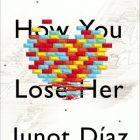Orthodoxy, Humor, and the Bookstore of Your Dreams: An Interview with Michael Lowenthal
To open any of Michael Lowenthal’s novels is to be struck by the visceral power of his images. From a woman’s “depthless smile” to a man with a belly like a rucksack, from flags snapping in the wind at a WWI parade to a description of an adolescent boy’s braces to a heartbreaking scene of two women doing each other’s makeup in a mirror-less room, Lowenthal’s descriptions wrest the reader directly into his characters’ struggles and delights. Even when his books grapple with questions of sexuality and power, there’s nothing didactic or abstract in them. We experience Lowenthal’s fictional worlds right alongside his characters—and those worlds are quirky and terrifying and sensuous and redeeming, and absolutely recognizable.
Lowenthal has just released his fourth novel, The Paternity Test, from University of Wisconsin Press.
RK: In The Paternity Test, Pat envisions having a child with Stu in order to create a new sense of family. Yet his growing bond with their surrogate mother threatens his relationship with Stu. As the plot of The Paternity Test emerged, what about it felt most exhilarating or taboo to write?
ML: What felt exciting for me to write about—a little bit itchy, if you know what I mean—was Pat’s reevaluation of being gay as his primary way of making sense of the world. I pictured him as someone who, like many gay people, had to reorient his entire way of being when he came out of the closet. He felt he had to sign on to a whole program of what it meant to be gay in his particular time and place: a certain set of attitudes about monogamy (or the lack thereof), a certain glorification of being marginalized, etc. And I wanted to write about how someone who has bought into this vision of gayness might eventually . . . well, might have buyer’s remorse. He might come to see that this new orthodoxy can be as bad a fit for him as was the previous version — that maybe orthodoxy itself is the problem. I have Pat say at one point, about his group of rebellious, New York City, sex-with-no-strings-attached peers: “We had all decided upon the same way to be different.” And there’s another line about how “our brand of liberation became a kind of trap.” I’m someone who has benefitted greatly from the gay-liberation movement, and I have fought proudly in some of its battles, so writing these lines—even from the point of view of a character who is separate from me—felt a bit like apostasy, or biting the hand that feeds me.
RK: Pat’s voice is often wonderfully funny. Can you talk about the role of humor in the book?
ML: I couldn’t imagine pulling the story off without some lightness, not only as a break from the darker parts but also as a way of giving readers—especially readers new to the subjects of surrogacy and “gay family values”—some permission to think, “Isn’t this all a bit . . . nutty?” If readers are going to think that, it’s much better for the writer to be out in front of them, as it were. And I hope this doesn’t offend anyone, but the very notion of surrogacy—of a stranger getting paid to carry someone else’s baby—seems to me to have at its core the whiplash of any good punch line: Wait, WHAT did you say? Surrogacy can be beautiful and supremely generous, but it also inspires a lot of nervous chuckling.
The more research I did, the more confident I felt about using humor. The accounts I found of would-be parents meeting their surros for the first time were almost universally romantic comedy-ish, like fumbly blind dates. And many of the stories of at-home insemination were pure slapstick. So I tried to honor these lighter moments, and to use them to enhance, instead of undercut, the more sober material. It was a delicate balance, and it may well make some readers uneasy. But another goal of mine is to never let readers get too comfortable. If there’s a point where I think they might be hardening their hearts toward a certain character, I hope to make them laugh at or with him. And then, when they’ve allowed themselves to relax and think everything’s going to be swell, I want to yank the rug out from under their feet.
RK: In both The Same Embrace and Avoidance, you write powerfully about exclusion. You don’t belittle the power of the we, or the pain of being rejected by it. Can you say something about your perspective on this subject?
ML: I’ve always been caught between my yearning to belong to something bigger than I am and my severe allergy to belonging. I tend to be lonely, but the common cures for loneliness—sex, family, religion, community—can leave me feeling even more isolated. For example, I’ve always been fascinated by religions and cults, the more orthodox the better (which is what led me to live with an Amish family for a few months during college); I fantasize about the security and purpose and solidarity that religious folks seem to feel. I mean, wouldn’t it be such an amazing relief to give up my own needs and desires, to have all the important decisions made for me? But when I’m being honest with myself, I know I would wither in such a situation. I’m not very good at self-abnegation. And on the flip side, I’m also—like Pat in The Paternity Test—disappointed by the inevitable conformity that arises among purported nonconformists.
Lately I’ve been wondering how much of my perspective on this stuff has to do with the fact that in terms of sexuality—which is my most obvious way of being “other”—I grew up pretty much being able to “pass” as straight. I had girlfriends to whom I was genuinely attracted, and I didn’t seem to set off other people’s gaydar. So, whereas someone outwardly queeny or effeminate may not have had any choice in being marginalized and stigmatized, I felt like I was more in control of my own destiny. To borrow Mitt Romney’s awful (but somehow resonant) phrase, I faced the choice of whether or not to “self-deport” from the mainstream. And choosing one’s own exile, I think, involves a different sort of pain—and possibly pleasure—than that of being forcibly exiled. It helps me focus, in my storytelling, on what is lost and gained on both sides of each character’s exclusion.
RK: In Charity Girl, Frieda Mintz, who has contracted syphilis from a single encounter with a charismatic soldier, is jailed by a WWI-era government-sponsored purity brigade and accused of endangering the health of American troops. The final lines of Charity Girl give me chill every time I read them. You often write about characters whose yearnings are called sickness. Was there anything different about exploring this through a female character, or in a historical setting?
ML: Sometimes I feel as though Frieda, despite being a woman, and despite having been born three-quarters of a century earlier than I, is the most autobiographical of my characters. By which I mean, here is I how I imagined her: she is filled from a young age with passionate desires that seem perfectly natural to her, such strong and beautiful-feeling desires that she can’t really understand or believe why the world condemns them and why she keeps getting into trouble because of them. So when she keeps getting knocked down, she keeps getting right back up—naively, maybe, and almost a bit thick-headedly—because it’s almost inconceivable to her that what she feels at her deepest core could be wrong. I identify with these feelings almost completely.
Writing about these emotions in a female character and in a historical setting was liberating, because I felt I could count on virtually all readers to be “on my side” in a way that they might not be if I were writing about, say, a gay man in the age of AIDS. (From the beginning, I saw Charity Girl as being, beyond its own specifically historical story, something of a parable about the response to AIDS.) From our 21st-century perspective, it’s much easier for readers to be purely horrified by the injustice of how women like Frieda were mistreated for pursuing desires that now seem completely normal. People can see this without getting into moral debates about “innocent victims” vs. “deserving degenerates,” etc. It’s similar, I think, to the way people are ready to read about the Japanese Internment in WWII as a clear-cut moral story, whereas they’re not yet as ready to come to the same conclusion about certain civil rights abuses in the so-called War on Terror.
RK: So how do you do that thing with verbs? Is it something you’re conscious of while writing, something you work at?
ML: I’m not sure I really know what you mean by “that thing with verbs.” To be honest, I’ve always felt self-consciously inferior about not having a prose style that’s particularly my own—in much the same way that I’ve always been disappointed/ashamed to speak with an unidentifiably bland newscasterese lack-of-accent, instead of having, say, a strong Boston or Baltimore sound. But just yesterday my sister sent me a mini essay by Floyd Skloot, about his dementia, and she said, “His writing style reminded me of you.” I wrote her back: “Um . . . the guy has dementia, and his writing style reminds you of mine?” Well, here’s the opening of Skloot’s essay: “I first turned 65 when I was 41. Geezered almost overnight after a viral attack to my brain in 1988, I was soon diagnosed with static dementia . . .” My sister said that what reminded her of my writing was the verb geezered. So maybe I do work hard to find interesting verbs? But I’ve always assumed that’s part of any writer’s attempt to avoid cliché. I mean, if there are only the proverbial seven basic plots in all of literature, you have to do something different, right?
RK: Your books have been categorized as mainstream literature, as Jewish literature, as gay literature. Would you like to say something about bookstores’ practice of labeling fiction, and how it shapes readers’ and writers’ experiences?
ML: What I worry about with the kind of labels you mention is that they make both readers and writers approach novels with a false and potentially warping in-group/out-group mentality. If a novel is labeled “Jewish fiction,” isn’t a non-Jewish reader given permission—forced, really—to approach the story as an outsider, and doesn’t that make her begin with a stance of “This isn’t about me,” which is exactly the opposite of what you want a reader to think about any story? By the same token, the “Jewish fiction” label may lead a Jewish reader to complacently over-identify: “Oh, I get this, this is me and my people”—which lets her off the hook, allowing her not to fully imagine the story’s emotions, as opposed to her own. I think writers, too, if they conceive of their own work as being categorized in these terms, run the risk of “talking outward” or “talking inward” too self-consciously.
Listen, I understand what bookstores and publishers are attempting when they label books according to identity categories, and to the extent that a label on a book might help it find an audience, I’m okay with that. I actually think this practice has helped my own book sales. But the labels have never made much gut sense to me, and I think they’re based on a misunderstanding of, or underestimation of, many readers’ motivations. I think it’s an oversimplification to assume that a Jewish reader, at this point in our history, is necessarily driven to see a depiction of her experiences as a Jewish person, or that a gay reader is driven to read about a gay person “just like me.” Maybe there’s, say, an painfully introverted Jewish reader, who is most affected by reading a novel about someone similarly introverted—even if that character is a Buddhist. Then again, maybe there are introverts (just to stick with that example) who are most excited by reading about fictional extroverts. Don’t many of us turn to fiction precisely so that we can identify with, and walk in the imagined shoes of, characters who do and say the things that we ourselves, in real life, never could?
So if we’re going to shelve fiction according to identity categories, might it not make more sense to classify books as, say, “Introvert Lit” and “Extrovert Lit”? Or “Giver Lit” and “Withholder Lit”? Or we could go by subject matter: “Betrayal” and “Reconciliation,” “Self-discovery” and “Self-sabotage.” What might be even more helpful for me, when I’m picking what to read next, would be if books were shelved according to style or mood: “minimalist fiction” in one aisle, “maximalist fiction” in the next; “passionate literature” here, “chilly literature” there?
RK: Now that The Paternity Test is out, what’s next for you?
ML: Besides persuading you to go in with me on a bookstore arranged as I’ve just described? I’m not sure. I guess I’ll keep my eyes peeled for a story that presses my usual buttons, and which I can use to press other people’s. I’d be thrilled if that story were in a different format: a nonfiction narrative, or a documentary film. The novel, as a form, can get a little old—or at least I can grow tired of it—but storytelling will always exert its pull.
RK: What will we call our bookstore?
ML: With a nod to a certain former chain, how about ‘No Borders’?



